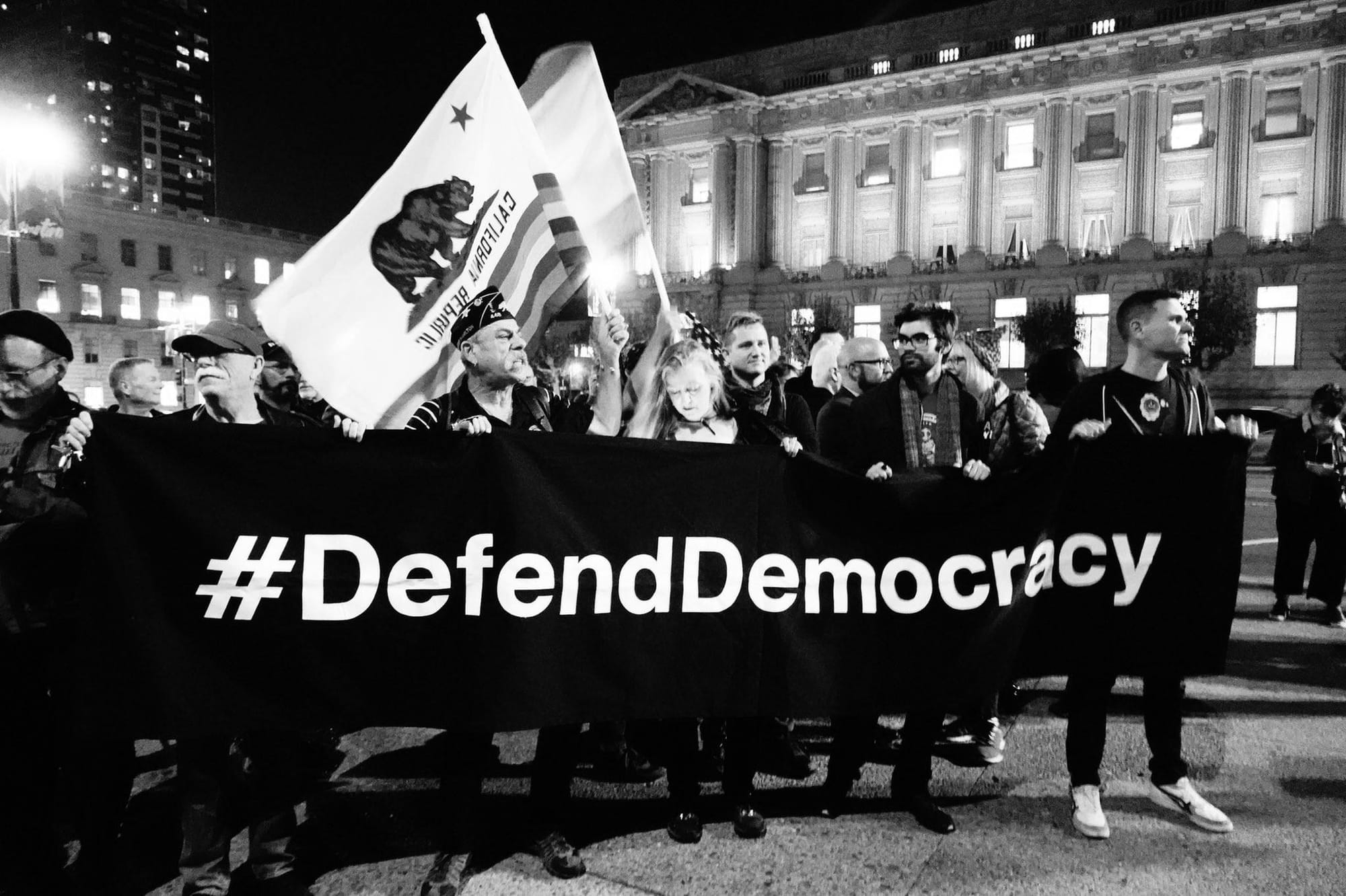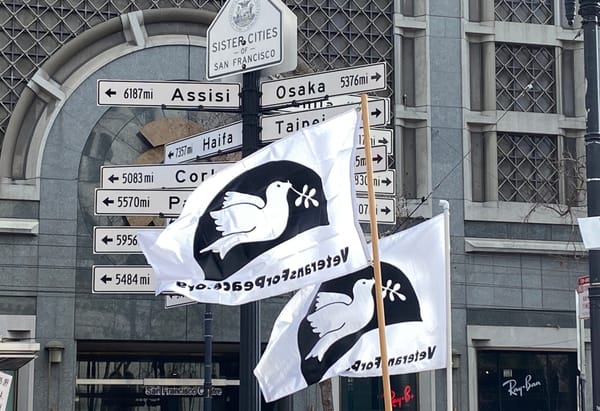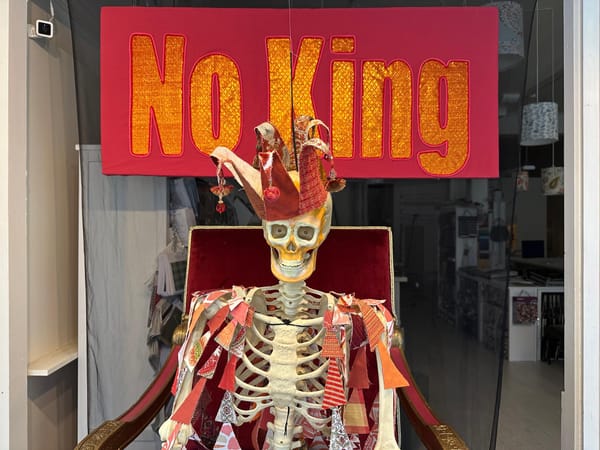Categories Are Leaky (Over-Generalizations are Dangerous)

Many people seem to love sweeping generalizations. Not all people, but lots of people I come across trying to discuss the politics of our time fall back on pretending that a category of people is homogenous as in all its members hold the same positions. If categories were indeed airtight and everyone within one was exactly the same as everyone else in that category, it would make the world stunningly simple, obvious, boring, and predictable. Plot spoiler: our world is not like that.
But such pretenses are not just sloppy; they're dangerous when people act on the premise that all members of a group are essentially the same, which readily translates into collective responsibility and is often the assumption behind racism, transphobia, homophobia, religious persecution, and acting it out as violence, discrimination, and abuse. It ultimately amounts to "I already know who you are and what you believe" that denies the possibility of individual consciousness and conscience.
Telling the truth is generally regarded as a matter of intention and moral character, but it's also a skill: the ability to delineate accurately what's going on out there and who exactly the parties are. As a skill, it means using language to describe the nuances and complexities of a party, a person, a phenomenon, a social group, to be able to note the contradictions and anomalies and exceptions, to keep your generalizations from sweeping up too many of those contradictions into too tidy a package.
Of course language is inherently generalizing: words like queer and female and summer and cloud pack in a lot of diverse things that have something in common. The word river means the Santa Fe River, parts of which I can jump across in summertime, and the wide mouth of the Rio Plata between Argentina and Uruguay that takes a few hours to cross by ferry. But there's language to qualify what kind of river you're talking about, and what kind of people you're talking about. And right now as the suppression of truth, fact, science, and history are deployed part of the arsenal of authoritarianism, resistance means, among other things, being the opposite of them in how we use language. To me that not just telling the truth (and checking the facts) as best we can but using language with precision and describing the world accurately. As Soviet refugee and poet Joseph Brodsky cautioned Marie Howe all those years ago, "you Americans, you are so naïve. You think evil is going to come into your houses wearing big black boots. It doesn’t come like that. Look at the language. It begins in the language." Now we have the boots and the language to resist.
Here's an example, one of many I could've chosen, of a recent sweeping generalization, this one from social media: "Dems: I guess we could say there's an actual real coup happening but that would make us look weak, like cowards, like abject failures, if we admitted it out loud in the newspaper." The person who wrote that either believes or would like to pretend that no Democrat has raised the alarm. That is true of too many Democrats who think that pretending it's all fine and we just want to hear about "kitchen table issues" is sane strategy. But it's extremely untrue of others. Oregon Senator Jeff Merkley declared in February, "We’re in the middle of an authoritarian administrative coup." Congressman Jamie Raskin has used the word coup a bunch. Congresswoman Alexandria Ocasio Cortez in early February tweeted: "This is a plutocratic coup." And so forth.
The statement claiming no one was saying "coup" was maybe driven by the desire to air grievances or just to be able to make a statement, but insofar as it erases the diversity of stances and speech within the party it's not helping people either understand the situation or support the Democrats who are speaking up. You'd think that if you hate Democrats who don't say "coup" you'd want to support ones who do, but this statement does not. So what is it supporting? The author's posturing as the coolest cynic on the block, a person who is not fooled, who knows what's what? The tendency to use absolutist all-or-nothing language ( including the maddening "nobody is doing anything" assertion erasing all the people who are doing amazing things) is a form of untruth, whatever the intention.
Not just Democrats! Last week I wondered on social media when some Republicans would find they'd come to a bridge too far. Nearly every reply was some form of never/I know exactly what can and cannot happen. Cynicism is often just premature defeatism about what can happen all dressed up as confidence about what will happen, and small numbers of Republicans have been peeling off from Trumpism here and there all along, and as things get more extreme more of that seems likely (even if, as I added to my comment, their only motive is self-interest, what self interest looks like can shift with circumstance). Congressman Eric Swalwell on Twitter announced on Wednesday, "It’s coming to an end guys. I’ve spoken to a lot of House Republicans this week and they’ve confided that Trump’s movement/support is fading. As one told me, 'this Epstein bomb is about to drop and no want wants to defend a pedo-protector. It’s just a matter of time.'"
But we did not have to wait for never to become now or even for another vote on releasing the Epstein files as soon as Speaker Johnson stops blocking the swearing in of newly elected Congresswoman Adelita Grijalva. This week, Congresswoman Marjorie Taylor Green is loudly revolting against the attempt to abolish Obamacare in the budget bill. She tweeted a few days ago: “Not a single Republican in leadership talked to us about this or has given us a plan to help Americans deal with their health insurance premiums DOUBLING!!!” and “I’m going to go against everyone on this issue because when the tax credits expire this year my own adult children’s insurance premiums for 2026 are going to DOUBLE, along with all the wonderful families and hard-working people in my district.”
A Republican governor has also defected. A New York Times story from yesterday tells us: "Gov. Kevin Stitt of Oklahoma, a Republican and the chairman of the National Governors Association, on Thursday criticized the deployment of Texas National Guard troops to Illinois as a violation of his beliefs in federalism and “states’ rights.” His comments, in an interview with The New York Times, marked the first time a Republican governor has questioned the interstate deployment of National Guard troops over a governor’s objections. " This brings up another category problem. Some of us want categories to be tidy and even airtight but all of us run into bad people doing good things and good people doing bad ones. Far-right Republican Liz Cheney messed up categories for lots of people when she became a leading player in holding Trump accountable for the January 6 insurrection. Some moderates then decided to overlook her other positions and actions to usher her all the way into their good person/our team category. She doesn't belong there.
But onward with my topic: the leakiness of categories, the lack of homogeneity within them. A key example for me was all the noise about how white women voted in the 2016 election, and then a lot of sweeping generalizations about that category of American, some of it based on inaccurate early reporting that a slim majority of us had indeed voted for DJT; it turned out in later accounting that it was actually a slim minority. But either way, white women was a category split down the middle.
Given a group approximately half of whom like Ray Charles better and half of whom prefer Aretha Franklin, does it work to say that this group likes Charles better? The white women category was useless in this respect, because it didn't contain a meaningful majority, but two opposing camps. However, you could readily find subcategories in which the great majority did vote one way or another in that election and subsequent ones. White evangelical Christians are hardcore Trump voters but then people make sweeping generalizations about evangelical Christians and even about Christians. Black evangelical Christians have very different politics. Fun side note, white evangelical Christians are a rapidly shrinking population; scholar Robert P. Jones notes, "The continued demographic decline makes it clear the MAGA goal of reestablishing their vision of a white Christian America can’t be realized by democratic means" and includes this chart.
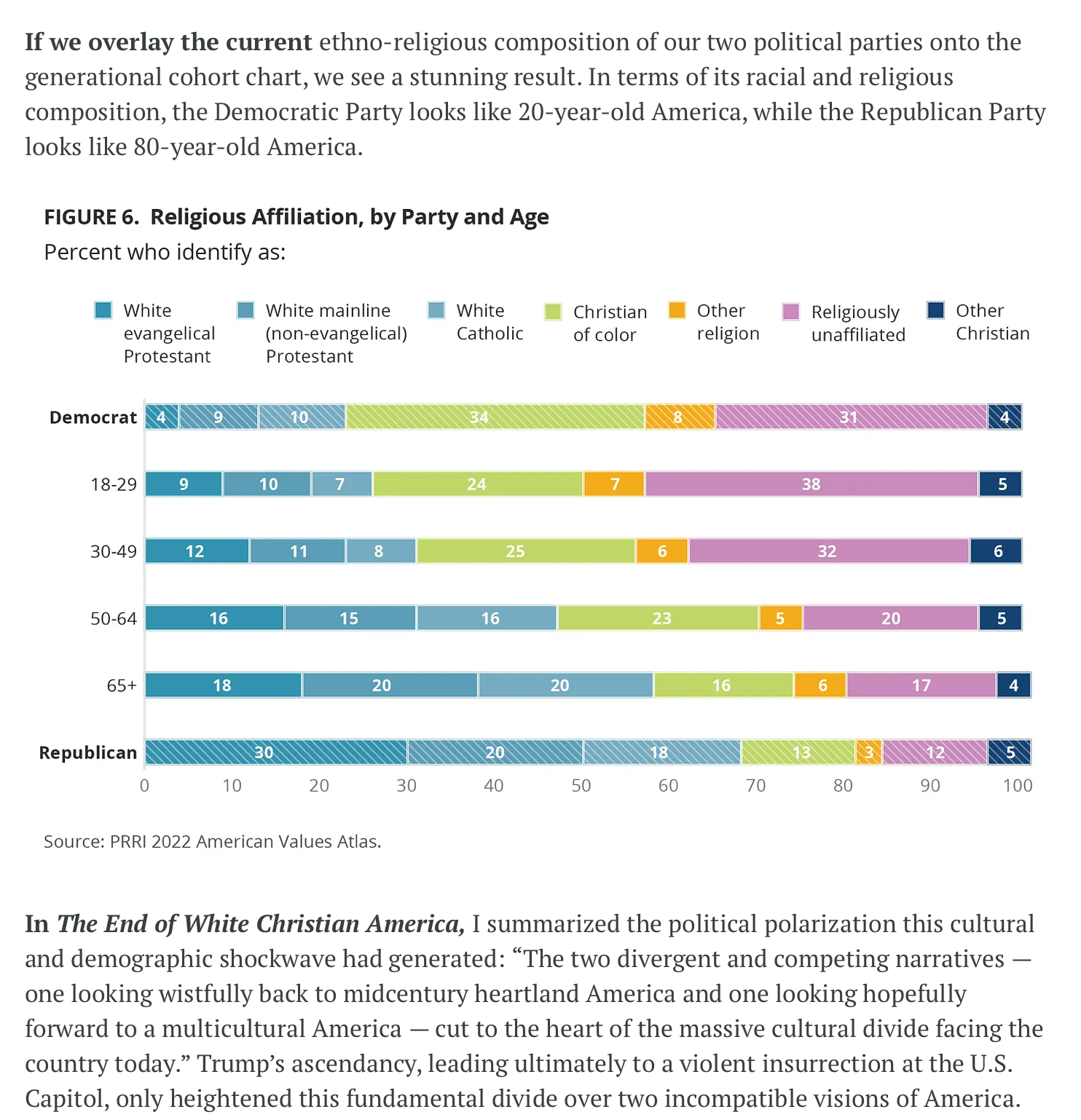
Three categories of white women I belong to are big majority-Democratic voters: college-educated, Jewish, Californian. College, incidentally, seems to make everyone more progressive, which could be one of the motives for the massive attacks on higher education by the Trumpists. Of all the race/gender categories in our elections, Black women come closest to a homogenous voting bloc: 90% of them voted for Kamala Harris in 2024, which you will note is still not 100%.
The whole idea of "being a credit to your race" as was once said patronizingly to and about Black people is the idea that your own conduct will be used as a verdict on all Black people, because racism is inseparable from this instinct to generalize and create the collective blame that leads to collective punishment. In conversation overgeneralization is dumb, but it's not just dumb because it's not just conversation: collective punishment as in "let's go hurt any members of this group" is based on the homogeneity assumption.
On September 28th a guy who had some kind of issue with his former girlfriend who was Mormon and apparently turned that into demonization of the whole group carried out a mass shooting and arson attack at a Mormon church in Michigan (but only killed and hurt individuals: the Detroit Free Press lists the dead as "Thelma Armstrong, John Bond, Pat Howard and Craig Hayden.... Eight others were injured in the attack" ranging in age "from 6 to 78"). On October 2, Yom Kippur, a mass stabbing with a similar car-ramming and arson fire at a synagogue in northern England were carried out by a guy who was maybe among those who think all Jews are supporters of the genocide in Israel, and boy is being Jewish being prone to sweeping generalizations from haters (and collective responsibility, including the "you killed Jesus"business many centuries after the event).
There's an old joke that if you put two Jews in a room, you get three opinions, which makes it frustrating (and scary stupid) that people pretend that all fifteen million or so Jews on earth have the same opinion. Pretending that they do is very useful for antisemitism (I'm on the fence about saying we or they, since I'm half-Jewish, and that on my father's side, and thereby a leaky category incarnate). But Jewish opinions about the state of Israel are diverse. There's another sweeping generalization of sorts that mashes up Israel the place, Israel the people, and Israel the government into one homogenous thing, helped along by the fact that the word "Israel" can mean any one or all of them. People also speak as if Israeli equals Jew; most of the nearly one quarter of Israelis who aren't Jewish are Muslim.
Pretending that all Palestinians support Hamas and all Israelis or all Jews support Netanyahu and his rampage is helpful for haters, though both these things also happen to be untrue (and you'd think people who understand that "not all Americans support Trump" could grasp it). Last month the Washington Post conducted a poll and reported of it, "Many American Jews sharply disapprove of Israel’s conduct of the war in Gaza, with 61 percent saying Israel has committed war crimes and about 4 in 10 saying the country is guilty of genocide against the Palestinians."
Meanwhile, the right is weaponizing a corrupted version of antisemitism that is really a strategy to delegitimize and even criminalize criticism of the far-right Israeli government (and use it to browbeat universities into suppressing and even punishing free speech on the issue; as you'll recall, the Trump regime also used ICE to imprison graduate students whose only crime was being Muslim immigrants who spoke up about the mass murder in Gaza). To claim that criticism of the regime is antisemitism you have to, among other things, pretend that no Jews are among the critics, when many are. But to say that does not mean ignoring that some actual antisemites have found horror at the Netanyahu government's atrocities useful for its purposes. Categories are leaky.
To take up the category problem around another minority, a whole lot of haters of trans people have adopted the stance that a crime by any trans person incriminates all trans people and wave around the tiny sex-crime-committing subset of this small population to try to prove their point. This is a maliciously dishonest tactic that has also been applied to almost every other minority, notably Muslims, who here in the US during the Bush era were treated as though they were all somehow culpable for the actions of a few extremists. It wasn't just a slur; it was the occasion for persecution by the US government of Arabs and Muslims in this country, and for some hate crimes (speaking of sloppy, those hate crimes included attacks on Sikhs and other non-Muslims, even a Latino guy I knew).
There are also categories politicians and pundits are eager not to incriminate which is why polarization and political threats and violence are often spoken of as though they are symmetrical phenomena, and the right and left are equally culpable. This is partly because the right's strategic attacks on the news industry as biased against it has made a lot of the mainstream journalism try constantly to prove it's not by this kind of softening, blurring treatment (and I think one of their category problems is a love of both-sides symmetry even when the two sides are decidedly asymmetrical).
I've been loving the people in Portland protesting ICE from inside big inflatable costumes of cute creatures, because that undermines the attempt to portray the anti-ICE left as terrorists while mocking how ICE dresses up as wartime commandos to brutalize civilians. The young man inside the inflatable chicken told local publication Willamette Week how the costumes disrupt the categories: "There’s been a nice overall whimsy that has shown up. The frog is amazing. We had a bunch of other inflatable people here last night, too. I saw people playing Twister the other day. What they rely on is fear. So by coming out in an absurdist manner, it speaks to them, to some extent, that we’re actually not that afraid. It also dismantles their narrative a little bit. When they try to describe this situation as 'war-torn,' it becomes much harder to take them seriously when they have to post a video saying [U.S. Secretary of Homeland Security] Kristi Noem is up on the balcony staring over the Antifa Army and it’s, like, eight journalists and five protesters and one of them is in a chicken suit."
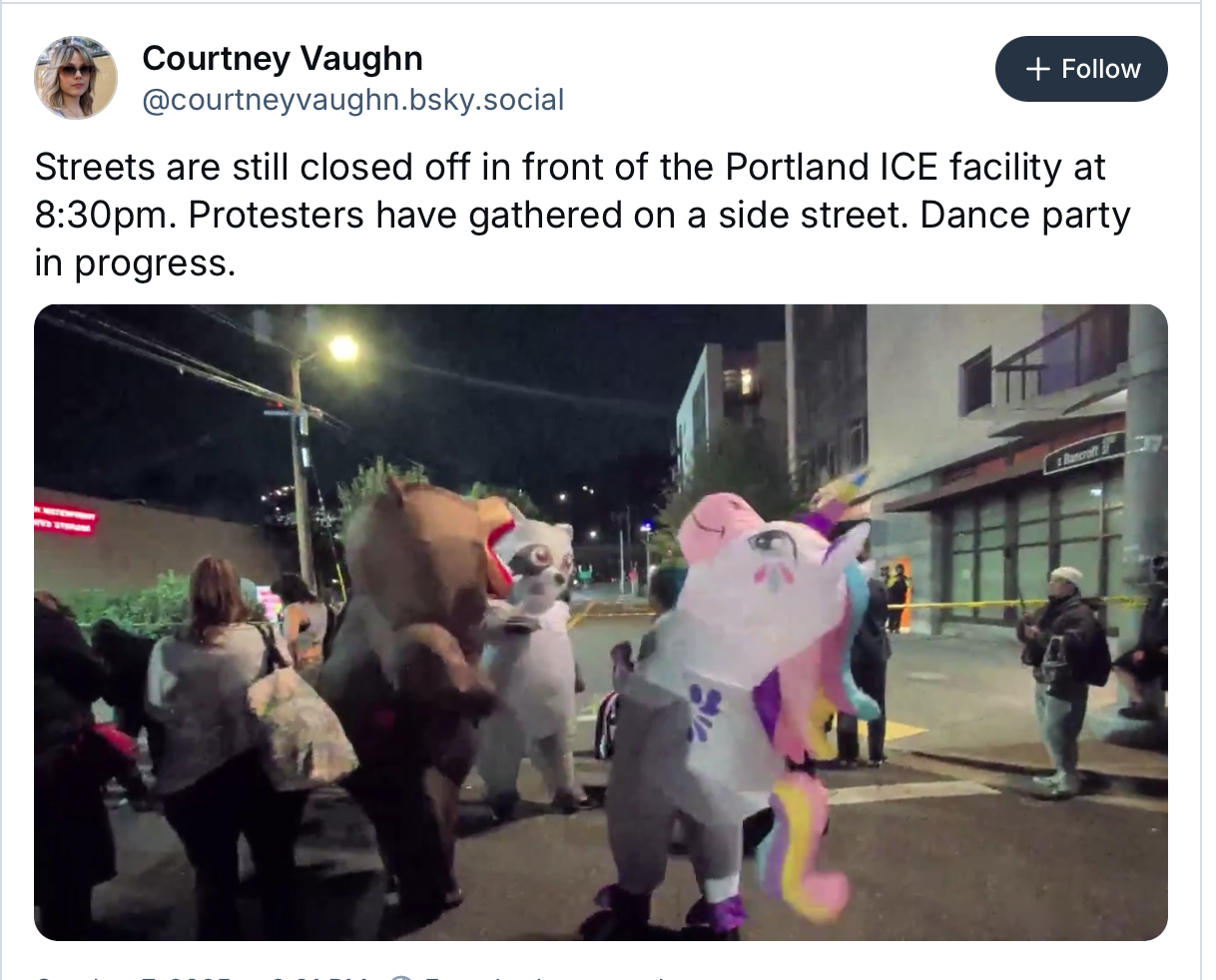
p.s. Apologies for typos and mangled sentences (which result from revising and not noticing that the revision is incomplete). I can fix them here but they go out on the mailings (and then I cringe).
